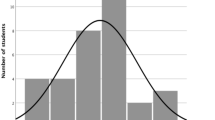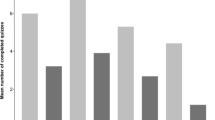Abstract
Psychologists and pedagogy researchers suggest the way people process information has changed dramatically in recent decades. Multitasking habits may be the primary cause for some college students’ self-reports about boredom in face-to-face classes (Barnes et al. 2007; Robinson and Stubberud 2012). Similarly, students may struggle when asked to respond to a knowledge-assessment test (Beaton 2017; Castillo 2017; Zwarun and Hall 2014).
Recent studies have found that attention focus is closely linked with mood (Kostyk et al. 2019). People generally prioritize affect regulation—which requires attention allocation and cognitive processing—over other mental processing (Gross 1998; Muraven and Baumeister 2000). Mental resource limitations and processing interdependencies cause affect regulation to impair memory and performance on subsequent cognitive tasks (e.g., anagram solving) (Amos et al. Keneson 2014; Bauer and Baumeister 2016; Muraven and Baumeister 2000).
Students’ emotions and mood fluctuate routinely. Responding to a knowledge-assessment test demands very high attentional control that drains cognitive resources (Ochsner and Gross 2005). Concurrently, most students are likely to experience negative affect when facing a knowledge-assessment test. Attempting to regulate this negative affect will reduce the attention they allocate to answering test questions unless that affect is alleviated.
Prior research suggests interruptions can modify emotional valences towards ongoing actions and induce better consumer outcomes in some contexts (Mandler 1990a, b; Nelson and Meyvis 2008; Nelson et al. 2009). Similarly, taking brief yet entertaining breaks from answering knowledge-assessment questions may increase students’ enjoyment of and attention to tests.
‘Surveytainment’ is the interactive and non-interactive questionnaire elements meant to improve survey respondents’ mood and consequently enhance their attentiveness and questionnaire-related attitudes (Kostyk et al. 2019). Knowledge-assessment tests are similar to questionnaires and might elicit stronger negative affect from students. Therefore, students—through better performance—and subsequently instructors—through better student evaluations of teaching—may benefit from including surveytainment elements in knowledge-assessment tests.
Results of a pretest and proposed empirical research agenda are discussed.
Access this chapter
Tax calculation will be finalised at checkout
Purchases are for personal use only
Similar content being viewed by others
Author information
Authors and Affiliations
Corresponding author
Editor information
Editors and Affiliations
Rights and permissions
Copyright information
© 2020 The Academy of Marketing Science
About this paper
Cite this paper
Kostyk, A., Zhou, W., Hyman, M.R. (2020). Use of Surveytainment Elements in Knowledge-Assessment Tests: An Abstract. In: Wu, S., Pantoja, F., Krey, N. (eds) Marketing Opportunities and Challenges in a Changing Global Marketplace. AMSAC 2019. Developments in Marketing Science: Proceedings of the Academy of Marketing Science. Springer, Cham. https://doi.org/10.1007/978-3-030-39165-2_178
Download citation
DOI: https://doi.org/10.1007/978-3-030-39165-2_178
Published:
Publisher Name: Springer, Cham
Print ISBN: 978-3-030-39164-5
Online ISBN: 978-3-030-39165-2
eBook Packages: Business and ManagementBusiness and Management (R0)




